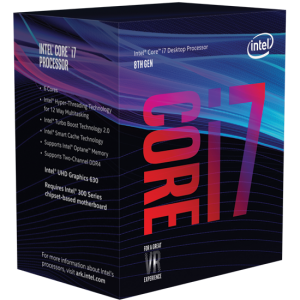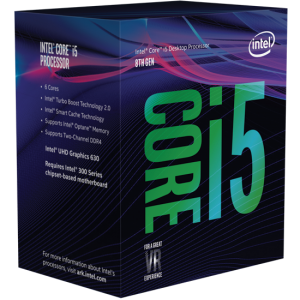Earlier this morning, Intel kicked off its series of 8th Gen CPU announcements by unveiling the low-power U-series for notebooks. However, there is still more to come, as Intel still has its desktop 8th Gen processors to announce. We have already heard several rumours about these processors and now, thanks to images of the retail packaging appearing, a few of them are confirmed.
Images of the retail packaging for both the 8th Gen Core i5 and Core i7 have appeared on Intel’s own website. It is a side view of the box, so we can see the list of key features that Intel is looking to push:
As you can see, both the Core i5 and Core i7 will be jumping to six core designs for 8th Gen. Aside from that, we can see Turbo Boost 2.0, Smart Cache, Optane Memory Support and dual-channel DDR4 will all be supported. Integrated graphics will be bumped up to Intel UHD Graphics 630.
Aside from confirming the jump to six cores, the packaging also states that these new CPUs will require the 300-series chipset. This is something that ASRock confirmed for us just a few weeks ago. This is all we know about Intel’s 8th generation CPUs officially for the time being. However, we did see an interesting leak last Friday:
| Kaby Lake | Single-thread Performance Gain (%) | Multi-thread Performance Gain (%) | Coffee Lake |
| Core i7 7700K | 11 | 51 | Core i7 8700K |
| Core i7 7700 | 18 | 58 | Core i7 8700 |
| Core i5 7600K | 19 | 55 | Core i5 8600K |
| Core i5 7400 | 29 | 61 | Core i5 8400 |
| Core i3 7350K | 17 | 65 | Core i3 8350K |
| Core i3 7100 | 16 | 61 | Core i3 8100 |
The table above contains information coming out of a Chinese presentation leak that surfaced on Friday. These are the performance gains we are currently expecting to see when jumping from 7th Gen to 8th Gen on the desktop. These numbers have yet to be confirmed, so do take it with a grain of salt.
KitGuru Says: It looks like Intel will finally be going beyond quad-core SKUs for its mainstream desktop processors. With that in mind, the 8th Generation will be pretty interesting to look at and compare against Ryzen.
 KitGuru KitGuru.net – Tech News | Hardware News | Hardware Reviews | IOS | Mobile | Gaming | Graphics Cards
KitGuru KitGuru.net – Tech News | Hardware News | Hardware Reviews | IOS | Mobile | Gaming | Graphics Cards





Obviously the 8700K “Multi-thread Performance Gain (%)” is going to be 50% from a 4 core to a 6 core lol, This is logic because there is 2 extra cores. I don’t understand why these chips require a new motherboard because all of them are LGA 1151 the same as 6th gen and the same as 7th gen.
AcuzA agreed on the LGA1151..they should have made them for at least the 200 series if nothing else. Bad move by Intel as this could have helped make them look good against Ryzen for Intel owners..
Would be nice if these procs worked on Z270, but it seems as though that will not be the case. There is apparently going to be not only a Z370, but a Z390 chipset for the new 8th gen.
Should have just bumped i7 to 6 cores, added HT to i5 and bumped i3 to 4 cores. That way there is a performance gain for every price segment and HT Pentiums and i3s won’t be on top of each other.
cash grab.
so much dead wood, processors and mother boards, x99 here i come
Exactly, the easiest thing for intel to do is to drop their prices accordingly, but they wont. I mean how does it makes sense for them to release a whole new series that requires a new motherboard in the same year as kabylake release, rebrand their i5s as i3’s and add 6 core cpus which require the same socket. Leaked cpu-z benches suggest that the 8700k is equivalent to a R5 1600x while the multi threaded performance is in favor op the R5 and the worst part is the 8700k will be double the price.
I’m sitting here frustrated at Intel, you are absolutly right on Kabylake release just recently especially with the 200 series motherboards…
same same, awesome thing about AM4 socket is that AMD will be releasing updated RYZEN versions until 2020 code name Zen 2 and Zen 3 which will be compatible with current AM4 motherboards, they guaranteed 4 year support for AM4 socket. Currently this socket supports their APU’s, quad core, six core and eight core chips, unlike intel releasing a new motherboard socket every year and now 2 times a year. I am just so glad that AMD have restored balance to the cpu market.